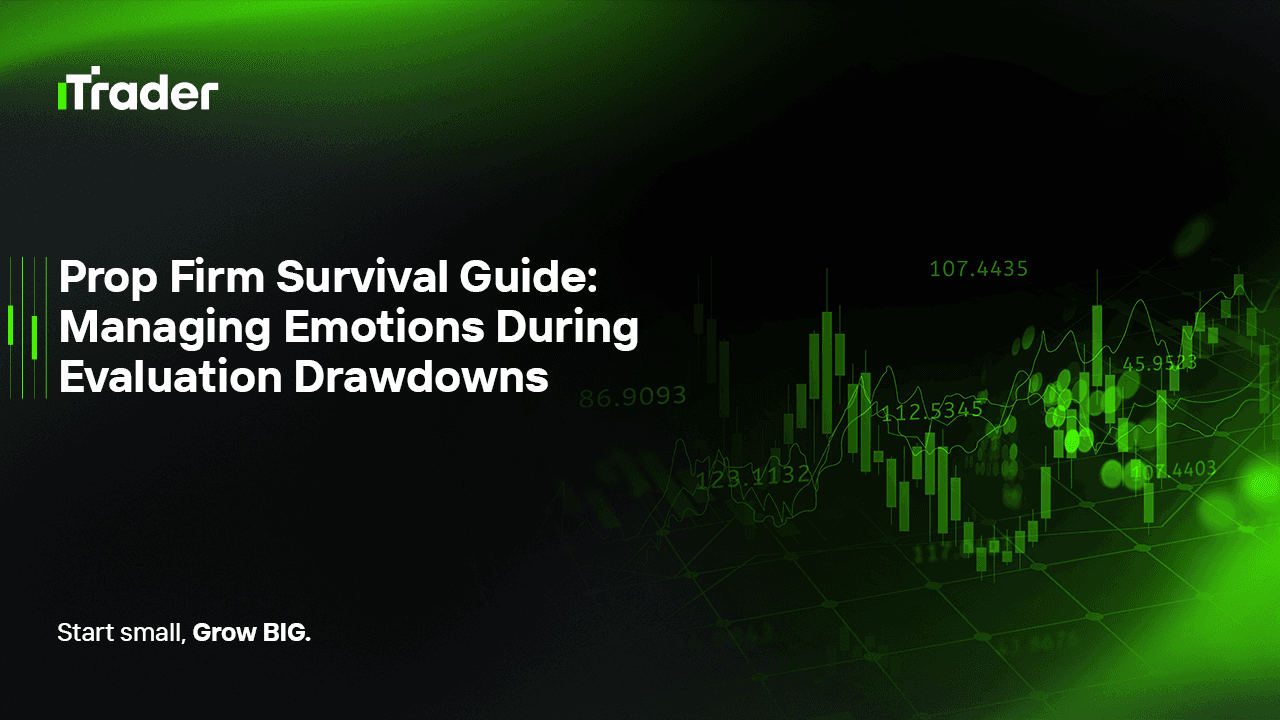2025-09-26
Prop firm challenges have become a gateway for aspiring traders to access larger trading capital. Passing such an evaluation means you can move beyond trading with your own limited funds and manage a professionally funded account. But behind this opportunity lies strict rules, unforgiving risk limits, and a true test of a trader’s discipline.

Most new traders prepare heavily on the technical side—indicators, strategies, backtests—yet they overlook the psychological challenge. The truth is that many traders fail not because of poor systems, but because they could not control their emotions when equity dropped. Drawdowns, in particular, are the most critical mental test.
This article explains what drawdowns are, why they matter in prop challenges, the emotional struggles they bring, and most importantly—how to manage them like a professional while staying beginner-friendly in approach.
A drawdown represents the decline in your account’s equity from its peak to the lowest point. For example:
Prop firms enforce strict limits such as:
Breaking either limit results in immediate disqualification, regardless of prior profits. That’s why drawdowns aren’t just numbers—they are the ultimate test of your risk management and discipline.
A drawdown is not just financial—it’s psychological. Traders under pressure often experience:
The thought of “I’m going to fail this challenge” leads to hesitation or closing trades too early.
Believing “The market is against me” can trigger impulsive decisions, breaking rules in search of quick revenge.
“I’m not good enough to be a trader” erodes confidence, leading to missed opportunities or giving up entirely.
The urge to win back losses quickly leads to oversized positions and risk-taking that only deepens the drawdown.
These emotions, if unmanaged, push traders into a downward spiral that usually ends with failing the challenge.
Have mechanical stop-points before emotions take over:
Such rules keep you from emotional overtrading.
Accept that drawdowns are part of the game, not proof of incompetence. Every system has natural fluctuations.
When emotions spike, step away. Deep breathing, a short walk, or even 10 minutes of detachment can reset your decision-making clarity.
Document how you feel during drawdowns. Over time, patterns emerge, giving you awareness of triggers that lead to mistakes.
Professional traders use meditation and visualization to mentally prepare for drawdowns, training the mind to stay calm under stress.
Experienced traders emphasize:
As one seasoned trader put it:
“You cannot control the market, but you can always control your response to it.”
Passing a prop firm challenge requires more than a profitable system. The real difference between those who succeed and those who fail lies in emotional control during drawdowns.
If you can:
you won’t just survive the challenge—you’ll build the foundation for a sustainable trading career.
In the end, the goal is not just to win trades, but to survive long enough to succeed.
© 2025 iTrader Global Limited | หมายเลขทะเบียนบริษัท: 15962
iTrader Global Limited ตั้งอยู่ที่ Hamchako, Mutsamudu, เกาะปกครองตนเอง Anjouan, สหภาพคอโมโรส และได้รับใบอนุญาตและอยู่ภายใต้การกำกับดูแลของคณะกรรมการหลักทรัพย์แห่งคอโมโรส ภายใต้หมายเลขใบอนุญาต L15962/ITGL
iTrader Global Limited ดำเนินการภายใต้ชื่อทางการค้า “iTrader” และได้รับอนุญาตให้ดำเนินกิจกรรมการซื้อขายฟอเร็กซ์ โลโก้ เครื่องหมายการค้า และเว็บไซต์ของบริษัทเป็นทรัพย์สินเฉพาะของ iTrader Global Limited
บริษัทย่อยอื่น ๆ ของ iTrader Global Limited ได้แก่ iTrader Global Pty Ltd หมายเลขทะเบียนบริษัทออสเตรเลีย (ACN): 686 857 198 โดยบริษัทนี้เป็นตัวแทนที่ได้รับอนุญาต (หมายเลขตัวแทนบริการทางการเงินของออสเตรเลีย (AFS): 001315037) ของ Opheleo Holdings Pty Ltd (ใบอนุญาตบริการทางการเงินของออสเตรเลีย (AFSL): 000224485) ซึ่งมีที่อยู่จดทะเบียนอยู่ที่ Level 1, 256 Rundle St, Adelaide, SA 5000 ข้อจำกัดความรับผิดชอบ: นิติบุคคลนี้ไม่ใช่ผู้ออก และไม่รับผิดชอบต่อผลิตภัณฑ์ทางการเงินที่ซื้อขายบนหรือผ่านเว็บไซต์นี้
คำเตือนความเสี่ยง: การซื้อขาย CFD มีความเสี่ยงสูงต่อการสูญเสียเงินทุนอย่างรวดเร็วเนื่องจากเลเวอเรจ และอาจไม่เหมาะสมกับผู้ใช้ทุกคน
การซื้อขายกองทุน CFD และผลิตภัณฑ์ที่มีเลเวอเรจสูงอื่น ๆ ต้องการความรู้เฉพาะทาง
จากผลการวิจัยพบว่า 84.01% ของผู้เทรดที่ใช้เลเวอเรจประสบกับการขาดทุน
โปรดตรวจสอบให้แน่ใจว่าคุณเข้าใจความเสี่ยงทั้งหมด และพร้อมที่จะสูญเสียเงินทุนก่อนที่คุณจะเข้าร่วมการซื้อขายที่มีเลเวอเรจ
iTrader ขอประกาศว่า บริษัทจะไม่รับผิดชอบต่อความเสี่ยง ความเสียหาย หรือการสูญเสียใด ๆ ที่เกิดขึ้นจากการซื้อขายแบบมีเลเวอเรจต่อบุคคลหรือนิติบุคคลใด ๆ ทั้งสิ้น
ข่าวสารและข้อมูลที่ปรากฏบนเว็บไซต์นี้มีไว้เพื่อวัตถุประสงค์ทางการศึกษาเท่านั้น ผู้ใช้ควรตัดสินใจทางการเงินอย่างอิสระและโดยใช้ข้อมูลอย่างรอบคอบ
ข้อจำกัด: iTrader ไม่ได้มุ่งเป้าเว็บไซต์หรือบริการไปยังผู้อยู่อาศัยในประเทศที่กฎหมายหรือข้อบังคับห้ามไม่ให้มีการทำธุรกรรมดังกล่าว
หากคุณอาศัยอยู่ในเขตอำนาจที่การใช้เว็บไซต์หรือบริการนี้ถูกจำกัด คุณต้องรับผิดชอบในการปฏิบัติตามกฎหมายท้องถิ่น
iTrader ไม่รับประกันว่าเนื้อหาบนเว็บไซต์ของบริษัทจะเหมาะสมหรือถูกต้องตามกฎหมายในทุกพื้นที่